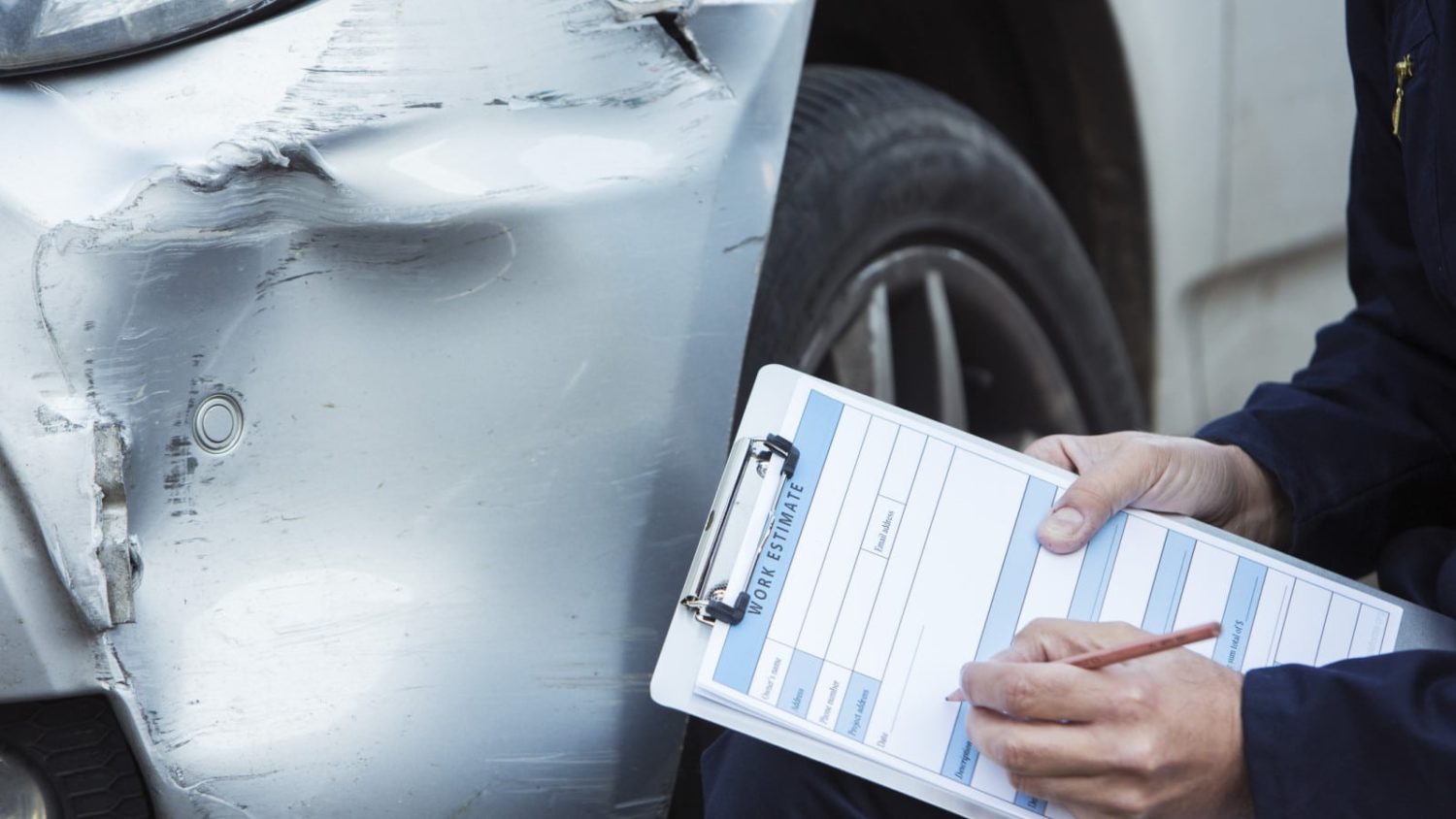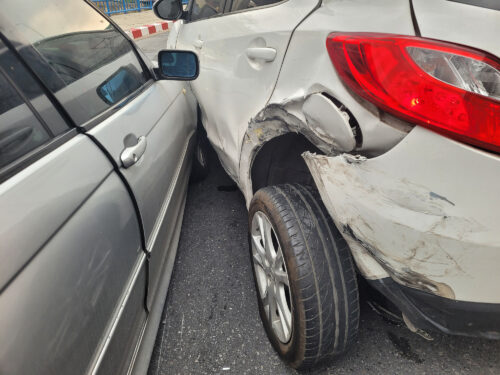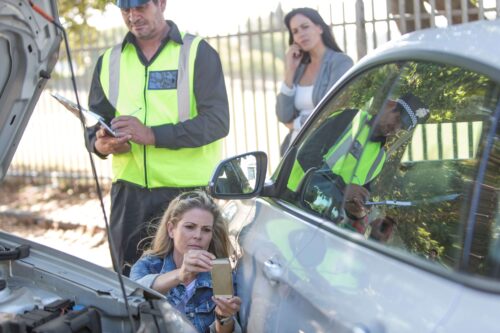
Minor accidents like fender benders might seem like no big deal, but knowing whether to call your insurance company is a decision that could impact your coverage and financial stability. Reporting the accident can help protect you from unexpected disputes, even if the damage appears insignificant. Jimmy Knows!® when it’s necessary to report an accident and how doing so can safeguard your rights. Keep reading to find out what steps to take and how to navigate this situation with confidence.
The Short Answer: Yes!
Even if an accident seems insignificant, contacting your insurance company can provide clarity and ensure you’re following proper procedures. Whether it’s a quick phone call to report the incident or a discussion about potential claims, keeping your insurer informed helps safeguard your rights and coverage.
Key Points Covered in This Article
Jimmy Knows!® the answers to these FAQs you may be asking after a minor accident:
- Am I legally required to report a minor car accident to my insurance company?
- When is it necessary to report a car accident to your insurance company?
- What are the benefits of reporting a minor car accident to your insurance company?
- What steps should I take after a minor car accident besides reporting it?
- Will my insurance premiums increase if I file a claim for an accident that wasn’t my fault?
- Is it a good idea to let the other driver pay out of pocket for a minor accident?
- What should I say when I contact my insurance adjuster after a minor accident?
- How much time do I have to report a car accident to my insurance company?
- Do I need to hire a lawyer for a minor car accident?
Am I legally required to report a minor car accident to my insurance company?
You are generally required to report any car accident to your insurance company, regardless of how minor it may seem. While the law doesn’t mandate that every fender bender be reported to your insurer, the terms of your insurance policy likely require you to notify them of any accident. Failure to do so could violate your policy agreement and jeopardize your coverage.
Massachusetts law requires you to file a crash report with the Registry of Motor Vehicles (RMV) and local police if the accident results in injury, death, or property damage exceeding $1,000.
When is it necessary to report a car accident to your insurance company?
In minor accidents, it can be tempting to avoid notifying your insurance company altogether because of concerns about rates going up or other related issues. This is generally not a good idea. Failing to report may put your entire claim at risk.
There are a few situations when notification is always recommended. These include circumstances where:
- Anyone suffered injuries because of the accident
- There is significant property damage caused by the accident
- The other driver was not driving legally
- The accident involved a pedestrian or bicyclist
If you think that you may want to file a claim, you should always notify your insurance company. In fault states, if you get the impression that the other driver or passengers will file a complaint, notification is always a good idea. In short, the default should be to notify your insurance carrier.
What are the benefits of reporting a minor car accident to your insurance company?
Reporting a minor car accident to your insurance company has several important benefits, even if the damage or injuries appear insignificant at first.
- Protecting Your Coverage: Most insurance policies require you to report all accidents, regardless of severity. Failure to do so could result in a violation of your policy terms, potentially jeopardizing your coverage if issues arise later.
- Preventing Future Disputes: Even if the other driver initially agrees to handle repairs privately, they could later change their mind and file a claim. Reporting the accident ensures your insurer is aware of the incident and can help protect you from surprise claims or lawsuits.
- Accessing Repairs and Benefits: If the accident involves damage to your vehicle or injuries, reporting it to your insurance company allows you to access coverage for repairs, medical bills, and other benefits under your policy.
- Establishing Documentation: Reporting the accident creates a formal record, which can be vital if there are disagreements about fault or the extent of damages. This documentation can help your insurer resolve disputes and ensure you’re treated fairly.
By reporting even minor accidents, you safeguard your rights and ensure you’re prepared for any unexpected developments that may arise later. It’s a simple step that can save you from significant complications down the road.
What steps should I take after a minor car accident besides reporting it?
After a minor car accident, there are several steps you should take in addition to reporting the incident to your insurance company:
- Check for Injuries: Ensure everyone involved is safe. Call for medical help if needed, even if injuries seem minor.
- Document the Scene: Take photos of the vehicles, license plates, damage, and any relevant road conditions or signs.
- Exchange Information: Collect contact and insurance details from the other driver(s) involved.
- Talk to Witnesses: If there are any witnesses, get their names and contact information, as their statements may support your case.
- File a Police Report: If required by law or if damages exceed a certain amount, notify the police and file a report.
- Contact a Lawyer: Even in minor accidents, legal complications can arise. Consulting a lawyer ensures your rights are protected, helps you understand your options, and provides guidance in case disputes or injuries surface later.
Taking these steps ensures you have all the information and support necessary to protect yourself in case of disputes or claims.
Will my insurance premiums increase if I file a claim for an accident that wasn’t my fault?
In Massachusetts, filing a claim for an accident that wasn’t your fault doesn’t automatically mean your premiums will increase. The outcome depends on the specifics of your policy and whether your insurer finds you partially at fault. Massachusetts follows a “no-fault” system for personal injuries, but fault is still determined for property damage claims.
If you are found to be less than 50% responsible, your premiums typically shouldn’t rise. If liability is disputed or unclear, your insurer may initially treat the claim as a risk factor. It’s always a good idea to discuss these details with your insurance provider or consult a lawyer to understand how the claim may impact your premiums.
Is it a good idea to let the other driver pay out of pocket for a minor accident?
No! While it might seem easier to let the other driver pay for repairs out of pocket, this approach carries significant risks. The other driver may initially agree to cover damages but later refuse or dispute the extent of the costs.
Injuries or hidden vehicle damage might not be immediately apparent. Without a formal claim, you may end up paying out of pocket for expenses that should have been covered by insurance.
By reporting the accident to your insurance company, you create a formal record and ensure the proper channels are followed. This protects you from unexpected disputes, additional costs, or liability issues. While out-of-pocket agreements might seem convenient, they often leave you vulnerable to future complications.
What should I say when I contact my insurance adjuster after a minor accident?
Some drivers feel nervous about speaking with their insurance company, fearing that what they say might be used against them later. While it’s natural to feel this way, it’s important to provide your own insurance company with accurate and relevant facts about the accident. Explain how the accident happened, identify who was involved, describe any visible property damage, and inform your insurer about any injuries you are aware of, even if they seem minor. If there are witnesses, mention their presence and provide their contact information.
If you’re contacted by the opposing party’s insurance company, it’s best not to speak with them directly; instead, consult a lawyer and refer the opposing insurer to your legal representative. A lawyer can help ensure your rights are protected and handle communications on your behalf, preventing you from accidentally saying something that could harm your claim.
How much time do I have to report a car accident to my insurance company?
You don’t need to call the insurance company immediately after the crash, but you should inform them promptly. Many insurance policies contain language that inhibits your ability to use coverage if the company is not reported within a specified timeframe. Often, this timeframe is within 72 hours of the accident.
There are situations where you may not be able to notify your insurance company due to injuries or incapacitation, but you should contact them as soon as practical. Prompt reporting ensures your claim is not jeopardized and that you remain eligible for the benefits provided under your policy.
Do I need to hire a lawyer for a minor car accident?
If there are disputes over fault, injuries that appear minor but worsen over time, or if the insurance company offers a settlement that doesn’t fully cover your expenses, an attorney can help protect your rights and ensure you receive fair compensation.
A lawyer can also handle communication with the insurance company, gather evidence, and negotiate on your behalf, saving you time and stress. Even in seemingly minor cases, having legal guidance can make a significant difference, especially if unexpected complications arise.
If you’ve been in a minor car accident in Boston, Sharon, or Cambridge and have questions about your claim, contact Jim Glaser Law for a free case review. Jimmy Knows!® how to help you navigate your case and fight for the compensation you could be owed. Don’t wait—reach out today!
















